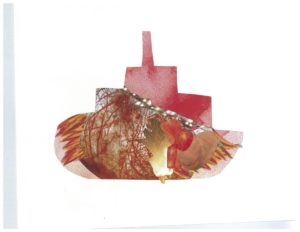Teigan Caldwell
Mercutio: *Gasps Awake* What the- Where am I? For some reason I find this place just slightly out of the ordinary. Why is everything so . . . gray? Am I dead? Who is responsible for this! Someone get me out of here! When I find whoever put me here I’ll- What’s this? A piece of paper?
‘Welcome To Purgatory . . .’ Huh. I guess that would explain it. Also, the fact that I appear to be translucent. Oh well. This is only a minor inconvenience on my quest for glory! But seriously this is getting boring. Why aren’t I going anywhere? Oh wait, there’s some print on the back, here. ‘Please Wait For All Remaining Parties Before Continuing.’ What is that supposed to mean?
Tybalt: *Gasps Awake*
Mercutio: Wait, Tybalt? You’re dead too? Ha! Karma!
Tybalt: Mercutio? I thought I killed you! Though I wouldn’t mind doing it again.
Mercutio: Well, for once in your life, you’re not wrong. I am dead, as it turns out. Thanks a lot, by the way, Fighty McStabberson, you pigheaded plague.
Tybalt: Prepare to fall again, this place isn’t big enough for-
Mercutio: Purgatory. It’s Purgatory.
Tybalt: JUST LET ME FINISH MY-
Mercutio: Also, you don’t appear to have your sword. And how did you die so quickly after I did? Or is time just screwed up here? Why is your face all red like that? You’re hiding something, I- No . . . Romeo killed you, didn’t he! Ha! MIGHTY MANURE, you’re pathetic! I used to place bets against the boy whenever you were around, no offense to him, of course. But now- Oh, don’t even bite that thumb, man. I’m gonna start pitying you soon.
Tybalt: Just shut up, will you! I will have you know that Villain Romeo is probably dying right now with the wounds I’ve inflicted.
Mercutio: First of all, Romeo is anything but a villain. Second, has anyone ever told you that you’re a terrible liar?
Tybalt: I’m going to tear open your chest with my teeth and then cut your throat with your own spine.
Mercutio: That was an unsettlingly detailed description.
Tybalt: WHERE IS MY SWORD?
Mercutio: Probably down in Verona.
Tybalt: What are you holding? Let me see!
Mercutio: Would it really be that hard to say ‘please?’
Tybalt: I WILL FIND A WAY TO DESTROY YOU AGAIN IF YOU KEEP THIS UP. ‘ . . . Purgatory . . . All Parties . . .’ This is preposterous!
Mercutio: How about a game of Rock Paper Scissors?
Tybalt: No.
Mercutio: Tic Tac Toe?
Tybalt: NO.
Mercutio: How about-
Tybalt: HOW ABOUT YOU BE QUIET.
Mercutio: Yes, ma’am.
Tybalt: What did you say?
Mercutio: Nothing . . . Oh no wait I said ‘yes MA’AM.’
Tybalt: WHY I OUGHTA-
*************************************************************************************
Paris: *Gasps Awake*
Tybalt: Oh, thank sanity, I was about to lose my mind alone with this guy.
Mercutio: Hey, I didn’t use all of my twenty questions yet, you can’t just stop playing!
Tybalt: I WAS NEVER PLAYING IN THE FIRST PLACE.
Paris: What is this place?
Tybalt: Purgatory, apparently.
Mercutio: You died, man. It’s okay, we’ve all been there.
Paris: I’m dead? H-How did I- ROMEO.
Mercutio: What about him?
Paris: Romeo killed me! That villain Romeo! I was spreading flowers in front of my dearest love’s tomb when he began to force it open. I stepped forward, planning to turn him into the Prince, when he drew his sword and killed me.
Tybalt: See? Villain! He agrees with me!
Paris: Were you two arguing?
Mercutio: I suppose one could put it that way, yes.
Tybalt: He killed me as well; I sense some form of foul play.
Mercutio: Oh, GIVE IT A REST, will you?
Paris: . . .
Tybalt: Do YOU by any chance know how to kill someone who is already dead?
Paris: Um . . . no? Should I be concerned?
Tybalt: Not you, no.
Mercutio: He was talking to me.
Paris: And you aren’t worried?
Mercutio: Eh. Not especially.
Paris: Who are all of you, anyways?
Mercutio: Well, I’m Mercutio . . .
Paris: Hmm . . . I-
Mercutio: And the huffy barbarian over there is Tybalt.
Tybalt: I can introduce MYSELF, you know!
Paris: Wait, Tybalt? Your name sounds familiar.
Tybalt: How so?
Paris: Are you . . . Juliet’s kinsman?
Mercutio: I think so.
Tybalt: I CAN ANSWER MY OWN QUESTIONS. Ahem. How do you know of her?
Paris: She was the loved one I was speaking of. I was going to marry her the very day when I found out that she had died; I am terribly sorry for your loss
Tybalt: Juliet is dead? How unfortunate.
Paris: You don’t seem nearly as upset as I expected you to be. . .
Mercutio: He has no soul. The fact that he can continue to the afterlife at all is straining my suspension of disbelief.
Tybalt: We were never especially close. Now then, ignoring those matters, I’m glad to hear that you practically joined the family. You should consider yourself an honorary Capulet.
Paris: Well, thank you. My name is Paris, by the way.
Mercutio: Wait, Paris? Oh, and Juliet!- Are you by any chance related to the Prince?
Paris: How did you know that?
Mercutio: I believe that we may share some of the same blood. Interesting.
Paris: Indeed.
Tybalt: You haven’t even met him before; how close can you be!
Mercutio: What you just said is, like, the DEFINITION of irony.
Tybalt: Ignore him. Don’t forget that Mercutio was also the friend of the man that murdered you, and that he still remains on his side despite this.
Paris: Very true, thank you.
Tybalt: Yes; remember that. So, you were betrothed to Juliet? She seems a little young for marriage, if you ask me.
Paris: Ah, but she was at the peak of beauty.
Mercutio: Creepy freak says what?
Paris: What?
Mercutio: I’m sorry, continue.
Paris: Well, I guess she moved on without us. What’s taking so long anyways
Tybalt: We have to wait for some more people to turn into corpses and join us, apparently.
Paris: Hmm. Disappointing. We could try to look for a way out of this place while we wait.
Tybalt: Better than just standing here.
Mercutio: Good idea. I’ll come with you.
Tybalt: GO AWAY.
Paris: Perhaps he should come.
Tybalt: WHAT?
Paris: I mean . . . what if we all need to be together before we can get out of here? If we get separated, we could get lost here forever! . . . Right?
Tybalt: . . . You’d better not soften up before this whole mess is over with.
Mercutio: That’s what she said.
Paris: Ha, ha! *Cough* I mean, I speak strictly behalf on our own wellbeing, of course.
Tybalt: . . . If you’re sure about that. Mercutio, you may walk with us.
Mercutio: As kind as your gesture is, I’d already invited myself.
Tybalt: Paris, this was your doing, not mine. Come on. Both of you.








